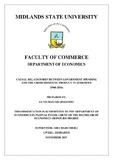Please use this identifier to cite or link to this item:
https://cris.library.msu.ac.zw//handle/11408/3044| Title: | Causal relationship between government spending and the gross domestic product in Zimbabwe (1960-2016) | Authors: | Master, Elvis | Keywords: | Gross domestic product Zimbabwe |
Issue Date: | 2017 | Publisher: | Midlands State University | Abstract: | The thrust of this study is based on two debatable backbones that is the Wagner’s Law and The Keynesian hypothesis. The Wagner’s law states that the government spending is stimulated by the gross domestic product whilst the Keynesian hypothesis states that the reverse is true. The study examined the causal relationship between the growth in Government Expenditure and the Gross Domestic Product in Zimbabwe from the 1960 up to 2016, using data from the World Bank at current United States dollars which allows us to see the effects of the fiscal policy. The size of the sample was also large and this provided precision for robust results. Using the Autoregressive Distributed Lag bounds test approach and the Granger causality test, evidence cointegration and the Wagner’s law was found in Zimbabwe. Basing on the results obtained from the study, the researcher recommended that the government of Zimbabwe should be cautious on their spending decisions since this will not stimulate the gross domestic product in the future. Thus government expenditure has turned out to be an ineffective policy instrument for fostering economic growth in Zimbabwe. | URI: | http://hdl.handle.net/11408/3044 |
| Appears in Collections: | Bachelor Of Commerce Economics Honours Degree |
Files in This Item:
| File | Description | Size | Format | |
|---|---|---|---|---|
| complete.pdf | Full Text | 1.13 MB | Adobe PDF |  View/Open |
Page view(s)
296
checked on Feb 21, 2026
Download(s)
388
checked on Feb 21, 2026
Google ScholarTM
Check
Items in MSUIR are protected by copyright, with all rights reserved, unless otherwise indicated.



